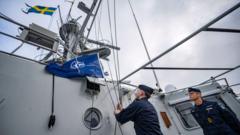The investigation into the damaged undersea telecoms cable highlights concerns over maritime security following increased incidents since Russia's invasion of Ukraine.
Undersea Telecoms Cable in Sweden: Sabotage Suspicions Raise International Concerns

Undersea Telecoms Cable in Sweden: Sabotage Suspicions Raise International Concerns
Sweden investigates damage to vital undersea cable amid heightened security tensions in Europe.
Swedish police are currently probing the suspected sabotage of an undersea telecoms cable located in the Baltic Sea, which serves as a crucial link between Germany and Finland. This incident occurs against a backdrop of escalated tensions due to Russia's invasion of Ukraine in 2022, prompting NATO to initiate a monitoring mission in the Baltic region as a precautionary measure last month.
In response to the reported breach, the Swedish Coastguard has mobilized a research vessel to investigate the situation near Gotland, Sweden's largest island. Prime Minister Ulf Kristersson acknowledged that the cable's damage "must be seen in the context of the current serious security situation,” suggesting that the government is taking these incidents very seriously.
The damaged cable is owned by Finnish telecom operator Cinia, which reported detecting minor damage, stating that, despite the breach, the cable continues to function properly. However, this marks the third incident involving damage to the same cable in recent months, following a complete severance in November of the previous year.
Recent months have seen an uptick in attacks or mishaps affecting undersea infrastructure in the Baltic Sea, which some experts attribute to civilian vessels dragging their anchors over the cables. Nonetheless, Swedish authorities have classified the ongoing investigation as a "preliminary investigation" related to suspected sabotage.
To facilitate the investigation, the Swedish Coastguard confirmed the deployment of the vessel KBV 003 to aid in examining the crime scene. European leaders have raised concerns about potential Russian involvement in these attacks, adding layers of complexity to the already tense international relations landscape.
In other developments, the Bulgarian ship Vezhen was recently cleared of any wrongdoing in connection with previous cable damages. However, a combination of adverse weather, inadequate equipment, and human error has been cited as contributing factors in some of the incidents affecting undersea infrastructure.
In summary, the investigation into the damaged telecoms cable is not only vital for maintaining communication links in the region but also serves as a salient reminder of the increasing risks to maritime security in the wake of geopolitical conflicts.
In response to the reported breach, the Swedish Coastguard has mobilized a research vessel to investigate the situation near Gotland, Sweden's largest island. Prime Minister Ulf Kristersson acknowledged that the cable's damage "must be seen in the context of the current serious security situation,” suggesting that the government is taking these incidents very seriously.
The damaged cable is owned by Finnish telecom operator Cinia, which reported detecting minor damage, stating that, despite the breach, the cable continues to function properly. However, this marks the third incident involving damage to the same cable in recent months, following a complete severance in November of the previous year.
Recent months have seen an uptick in attacks or mishaps affecting undersea infrastructure in the Baltic Sea, which some experts attribute to civilian vessels dragging their anchors over the cables. Nonetheless, Swedish authorities have classified the ongoing investigation as a "preliminary investigation" related to suspected sabotage.
To facilitate the investigation, the Swedish Coastguard confirmed the deployment of the vessel KBV 003 to aid in examining the crime scene. European leaders have raised concerns about potential Russian involvement in these attacks, adding layers of complexity to the already tense international relations landscape.
In other developments, the Bulgarian ship Vezhen was recently cleared of any wrongdoing in connection with previous cable damages. However, a combination of adverse weather, inadequate equipment, and human error has been cited as contributing factors in some of the incidents affecting undersea infrastructure.
In summary, the investigation into the damaged telecoms cable is not only vital for maintaining communication links in the region but also serves as a salient reminder of the increasing risks to maritime security in the wake of geopolitical conflicts.




















